os.system(cmd),其返回值是shell指令运行后返回的状态码,
int类型,
0--表示shell指令成功执行,
256--表示shell未找到,
该方法适用于shell命令不需要输出内容的场景。
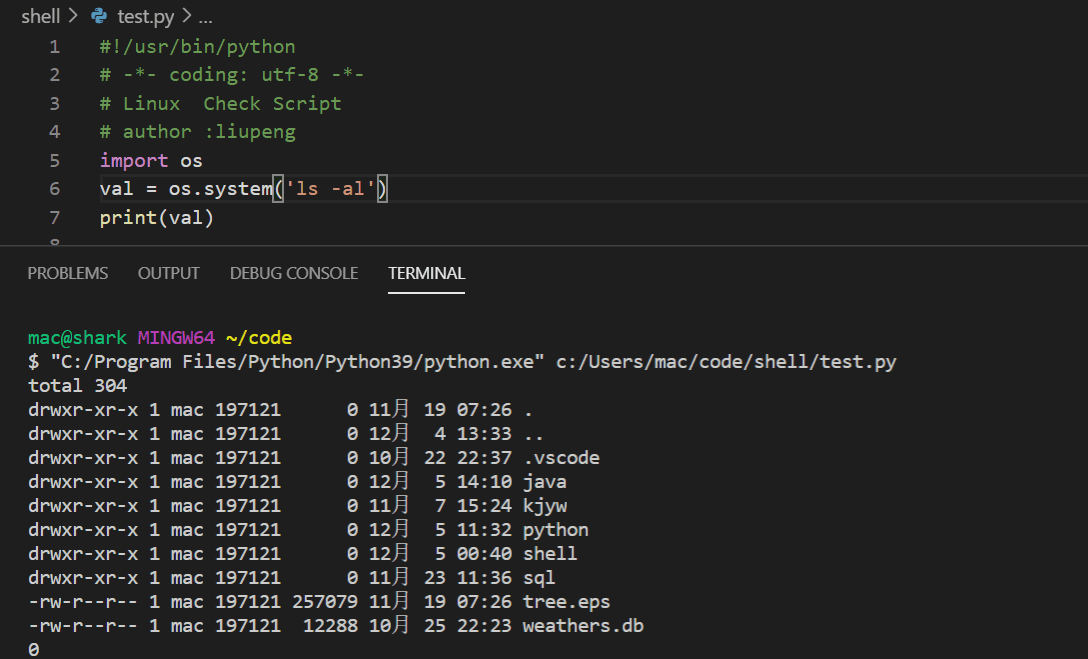
该方法以文件的形式返回shell指令运行后的结果,
需要获取内容时可使用read()或readlines()方法,举例如下:
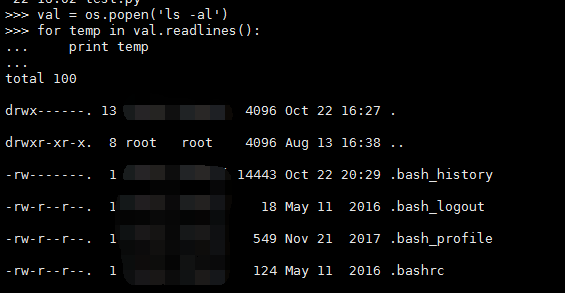
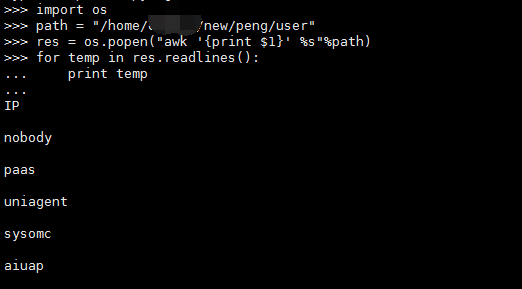
(1)commands.getstatusoutput(cmd),其以字符串的形式返回的是输出结果和状态码,即(status,output)。
(2)commands.getoutput(cmd),返回cmd的输出结果。
(3)commands.getstatus(file),返回ls -l file的执行结果字符串,调用了getoutput,不建议使用此方法
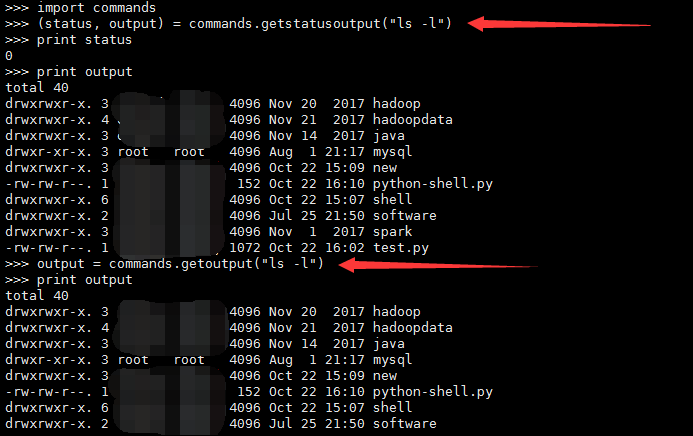

允许创建很多子进程,创建的时候能指定子进程和子进程的输入、输出、错误输出管道,执行后能获取输出结果和执行状态。
(1)subprocess.run():python3.5中新增的函数, 执行指定的命令, 等待命令执行完成后返回一个包含执行结果的CompletedProcess类的实例。
(2)subprocess.call():执行指定的命令, 返回命令执行状态, 功能类似os.system(cmd)。
(3)subprocess.check_call():python2.5中新增的函数, 执行指定的命令, 如果执行成功则返回状态码, 否则抛出异常。
说明:subprocess.run(args, *, stdin=None, input=None, stdout=None, stderr=None, shell=False, timeout=None, check=False, universal_newlines=False)
subprocess.call(args, *, stdin=None, stdout=None, stderr=None, shell=False, timeout=None)
subprocess.check_call(args, *, stdin=None, stdout=None, stderr=None, shell=False, timeout=None)
args:表示shell指令,若以字符串形式给出shell指令,如"ls -l "则需要使shell = Ture。否则默认已数组形式表示shell变量,如"ls","-l"。
当使用比较复杂的shell语句时,可以先使用shlex模块的shlex.split()方法来帮助格式化命令,然后在传递给run()方法或Popen。
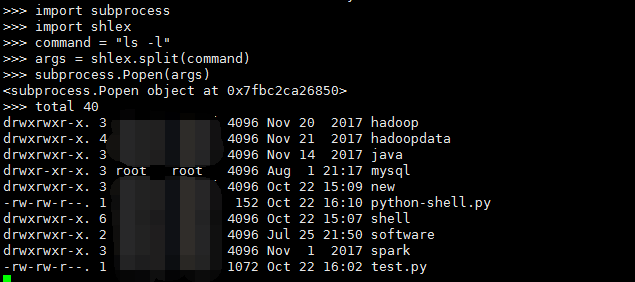
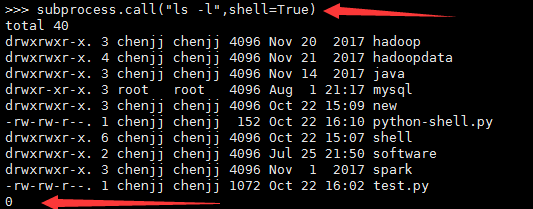
附上python2.7中的subprocess模块源码供理解(pycharm查看方法源码,ctrl+左键)。
# Stubs for subprocess # Based on http://docs.python.org/2/library/subprocess.html and Python 3 stub from typing import Sequence, Any, Mapping, Callable, Tuple, IO, Union, Optional, List, Text _FILE = Union[None, int, IO[Any]] _TXT = Union[bytes, Text] _CMD = Union[_TXT, Sequence[_TXT]] _ENV = Union[Mapping[bytes, _TXT], Mapping[Text, _TXT]] # Same args as Popen.__init__ def call(args: _CMD, bufsize: int = ..., executable: _TXT = ..., stdin: _FILE = ..., stdout: _FILE = ..., stderr: _FILE = ..., preexec_fn: Callable[[], Any] = ..., close_fds: bool = ..., shell: bool = ..., cwd: _TXT = ..., env: _ENV = ..., universal_newlines: bool = ..., startupinfo: Any = ..., creationflags: int = ...) -> int: ... def check_call(args: _CMD, bufsize: int = ..., executable: _TXT = ..., stdin: _FILE = ..., stdout: _FILE = ..., stderr: _FILE = ..., preexec_fn: Callable[[], Any] = ..., close_fds: bool = ..., shell: bool = ..., cwd: _TXT = ..., env: _ENV = ..., universal_newlines: bool = ..., startupinfo: Any = ..., creationflags: int = ...) -> int: ... # Same args as Popen.__init__ except for stdout def check_output(args: _CMD, bufsize: int = ..., executable: _TXT = ..., stdin: _FILE = ..., stderr: _FILE = ..., preexec_fn: Callable[[], Any] = ..., close_fds: bool = ..., shell: bool = ..., cwd: _TXT = ..., env: _ENV = ..., universal_newlines: bool = ..., startupinfo: Any = ..., creationflags: int = ...) -> bytes: ... PIPE = ... # type: int STDOUT = ... # type: int class CalledProcessError(Exception): returncode = 0 # morally: _CMD cmd = ... # type: Any # morally: Optional[bytes] output = ... # type: Any def __init__(self, returncode: int, cmd: _CMD, output: Optional[bytes] = ...) -> None: ... class Popen: stdin = ... # type: Optional[IO[Any]] stdout = ... # type: Optional[IO[Any]] stderr = ... # type: Optional[IO[Any]] pid = 0 returncode = 0 def __init__(self, args: _CMD, bufsize: int = ..., executable: Optional[_TXT] = ..., stdin: Optional[_FILE] = ..., stdout: Optional[_FILE] = ..., stderr: Optional[_FILE] = ..., preexec_fn: Optional[Callable[[], Any]] = ..., close_fds: bool = ..., shell: bool = ..., cwd: Optional[_TXT] = ..., env: Optional[_ENV] = ..., universal_newlines: bool = ..., startupinfo: Optional[Any] = ..., creationflags: int = ...) -> None: ... def poll(self) -> int: ... def wait(self) -> int: ... # morally: -> Tuple[Optional[bytes], Optional[bytes]] def communicate(self, input: Optional[_TXT] = ...) -> Tuple[Any, Any]: ... def send_signal(self, signal: int) -> None: ... def terminate(self) -> None: ... def kill(self) -> None: ... def __enter__(self) -> 'Popen': ... def __exit__(self, type, value, traceback) -> bool: ... # Windows-only: STARTUPINFO etc. STD_INPUT_HANDLE = ... # type: Any STD_OUTPUT_HANDLE = ... # type: Any STD_ERROR_HANDLE = ... # type: Any SW_HIDE = ... # type: Any STARTF_USESTDHANDLES = ... # type: Any STARTF_USESHOWWINDOW = ... # type: Any CREATE_NEW_CONSOLE = ... # type: Any CREATE_NEW_PROCESS_GROUP = ... # type: Any





